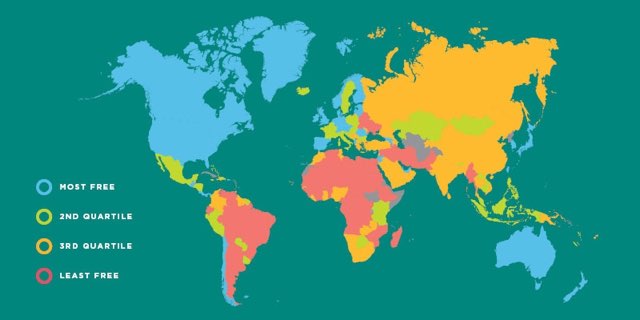September 25, 2018
Nassau, Bahamas—The Bahamas ranks 49 out of 162 countries and territories included in the Economic Freedom of the World: 2018 Annual Report, released today by The Nassau Institute in conjunction with Canada’s Fraser Institute.
Hong Kong and Singapore again top the index, continuing their streak as 1st and 2nd respectively. New Zealand, Switzerland, Ireland, the United States, Georgia, Mauritius, the United Kingdom, Australia and Canada (tied for 10th) round out the top 10.
The 2018 report was prepared by James Gwartney, Florida State University; Robert A. Lawson and Ryan Murphy of Southern Methodist University; and Joshua Hall, West Virginia University.
It’s based on data from 2016 (the most recent year of available comparable data) and measures the economic freedom (levels of personal choice, ability to enter markets, security of privately owned property, rule of law, etc.) by analysing the policies and institutions of 162 countries and territories.
The 10 lowest-ranked countries are Sudan, Guinea-Bissau, Angola, Central African Republic, Republic of Congo, Syria, Algeria, Argentina, Libya and last-place Venezuela. Some despotic countries such as North Korea and Cuba can’t be ranked due to lack of data.
Other notable countries include Germany (20th), Japan (41st), France (57th), Russia (87th) and China (108th).
According to research in top peer-reviewed academic journals, people living in countries with high levels of economic freedom enjoy greater prosperity, more political and civil liberties, and longer lives.
For example, countries in the top quartile (25 per cent) of economic freedom (such as the U.K., Japan and Ireland) had an average per-capita income of US$40,376 in 2016 compared to US$5,649 for the bottom quartile countries (such as Venezuela, Iran and Zimbabwe).
And life expectancy is 79.5 years in the top quartile of countries compared to 64.4 years in the bottom quartile.
“Where people are free to pursue their own opportunities and make their own choices, they lead more prosperous, happier and healthier lives,” said Fred McMahon, Dr. Michael A. Walker Research Chair in Economic Freedom with the Fraser Institute.
The Fraser Institute produces the annual Economic Freedom of the World report in cooperation with the Economic Freedom Network, a group of independent research and educational institutes in nearly 100 countries and territories. It’s the world’s premier measurement of economic freedom, measuring and ranking countries in five areas: size of government, legal structure and security of property rights, access to sound money, freedom to trade internationally and regulation of credit, labour and business.
See the full report at www.fraserinstitute.org/economic-freedom.
The Bahamas scores in key components of economic freedom (from 1 to 10 where a higher value indicates a higher level of economic freedom):
- Size of government: changed to 8.28 from 7.97 in the last year’s report
- Legal system and property rights: changed to 6.66 from 6.80
- Access to sound money: changed to 6.89 from 6.84
- Freedom to trade internationally: changed to 6.69 from 6.72
- Regulation of credit, labour and business: remained the same at 8.17
Hong King tops the rankings with scores of; Size of government: 8.59; Legal system and property rights: 7.9; Access to sound money: 9.57; Freedom to trade internationally: 9.32; Regulation of credit, labour and business: 9.44, goals for The Bahamas to work toward.
About the Economic Freedom Index
Economic Freedom of the World measures the degree to which the policies and institutions of countries support economic freedom. This year’s publication ranks 162 countries and territories. The report also updates data in earlier reports in instances where data has been revised.
For more information on the Economic Freedom Network, datasets, and previous Economic Freedom of the World reports, visit www.fraserinstitute.org. And you can ‘Like’ the Economic Freedom Network on Facebook at www.facebook.com/EconomicFreedomNetwork.
-30-
CONTACTS:
(242) 302-0130 extension 2226
For more information on the Economic Freedom Network, datasets, and previous Economic Freedom of the World reports, go to www.fraserinstitute.org/economic-freedom.
About The Nassau Institute
Founded in 1995 The Nassau Institute is a research institute – a think tank- that promotes capitalism and free markets. Our mission is to formulate and promote public policies for The Bahamas based on the principles of limited government, individual freedom, and the rule of law.
The Nassau Institute encourages the revival of historical research promoting the free and enterprising commonwealth and countering the political philosophy of statism in all its forms.
The Institute draws from the works of scholars such as Ludwig Von Mises, Friedrich Hayek, Murray Rothbard and others of the Austrian School as well as contemporary economists such as Milton Friedman, James Buchanan, George Reisman and numerous others who have advanced the cause of liberty.


